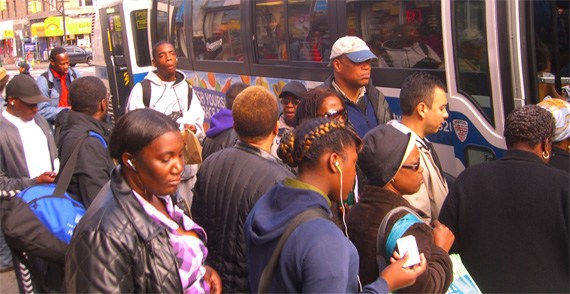With bus ridership in free-fall, the MTA must use the rollout of its new fare payment system to adopt all-door boarding citywide as soon as possible, advocates testified at today's MTA board meeting.
"As an organizer, I get to speak to bus riders every single day who share their stories with me about how unreliable their bus commutes are," testified Riders Alliance organizer Stephanie Burgos-Veras. "There is something that the MTA can do right now that doesn’t have to depend on Mayor de Blasio, and that’s all-door boarding."
All-door boarding has proven to speed up trips on Select Bus Service routes, such as the B44 in Brooklyn, where it shaved 40 percent off the time consumed by boarding [PDF]. But there are barely a dozen SBS routes in the city, and on those routes, the current fare system depends on expensive ticket vending machines on the sidewalk that are often more of a hassle than a convenience.
New York is falling behind cities like London and San Francisco that have deployed all-door boarding on every route citywide.
The next-generation fare payment system, set to begin rollout sometime in 2019, could quickly enable tap-and-go payment and all-door boarding on every bus route. In addition to rider advocacy groups, the transition to citywide all-door boarding has the backing all three unions representing bus operators, who believe it improves driver safety by separating them from the process of fare collection.
Nevertheless, the MTA has been reluctant to commit to citywide all-door boarding. The procurement contract approved by its board in October only mentions "trials of on-board fare collection and all-door boarding" on some routes, sometime in late 2019 or later. There is no commitment to city-wide all-door boarding.
That's not fast enough, TransitCenter Deputy Director Tabitha Decker told board members. To put riders first, the agency needs to adapt new fare technology to their needs faster than it did with the MetroCard.
"When the MetroCard was first introduced, it was little more than a plastic token," she said. "Bus-to-subway transfers, [and] monthly and weekly fare cards came later, and that was thanks to outside pressure on the MTA."
Decker and Burgos-Veras think the MTA can come up with a plan by the first half of 2018 for implementation of citywide all-door boarding, so that it rolls out concurrently with the new fare payment system.
"This time around, when the MetroCard is replaced, MTA leadership should put riders first from the start, and should introduce systemwide improvements that modern fare payment systems make possible," Decker said. "All-door boarding is a proven strategy that we can use to turn the system around and attract riders back to the bus."






